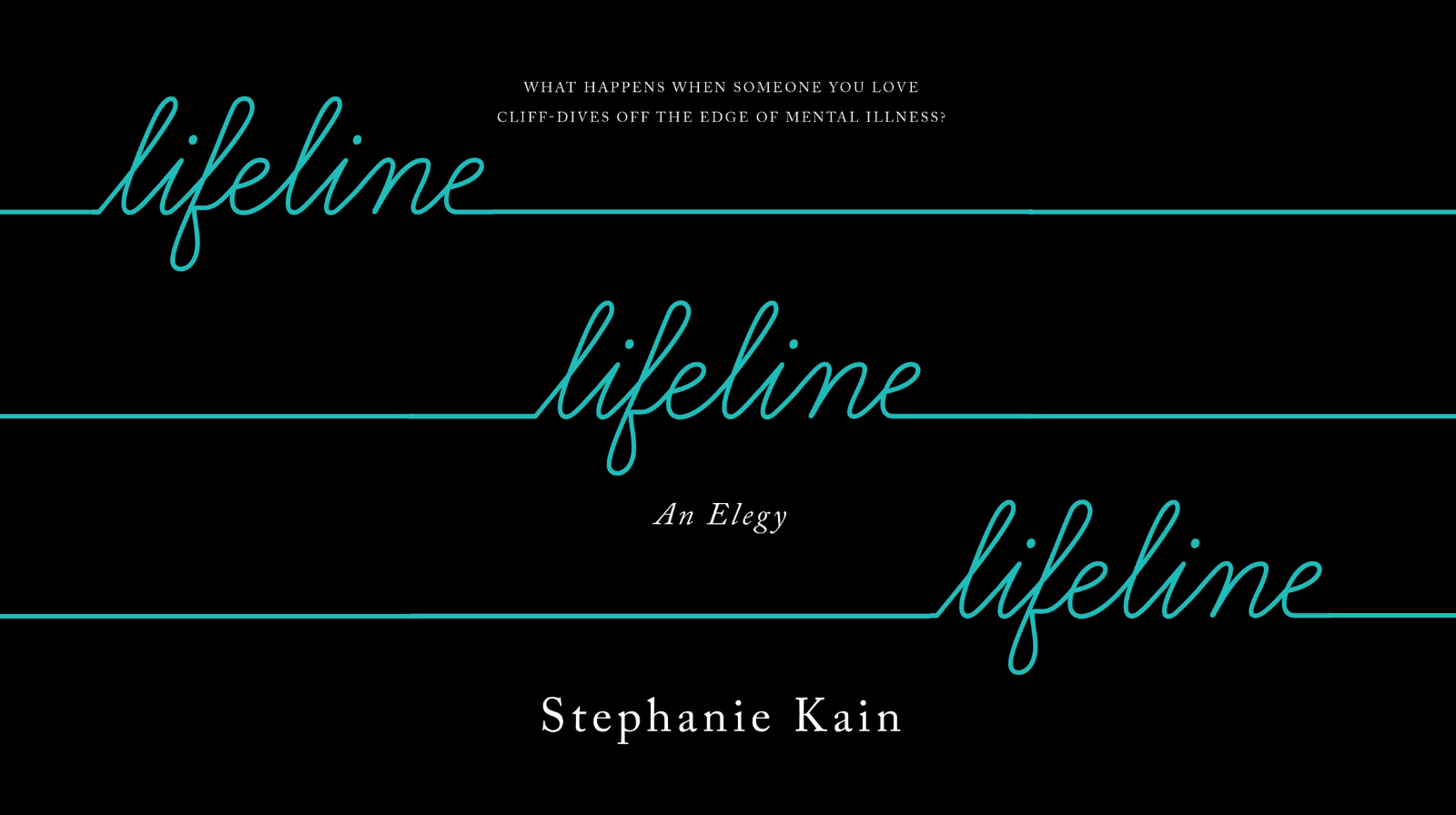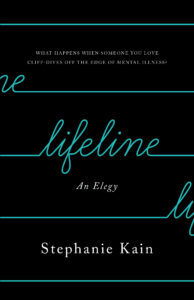Book Club – Lifeline: An Elegy

Subscribe to Catalyst
Subscribe to get our magazine delivered right to your inbox
Related Articles
Subscribe to Catalyst
Subscribe to get our magazine delivered right to your inbox
Related Articles
What happens when someone you love cliff-dives off the edge of mental illness?
This question appears on the cover of Stephanie Kain’s novel-memoir Lifeline: An Elegy (ECW Press, October 2023). Kain answers that and other questions over 210 pages of prose, text exchanges, short stories, and essays.
 The book is stunning in its fragmented format, befitting the author’s experience of grappling with a frayed healthcare system, one’s own perspectives and biases, the mental illness of a loved one, and daily life challenges during the emergency phase of the pandemic.
The book is stunning in its fragmented format, befitting the author’s experience of grappling with a frayed healthcare system, one’s own perspectives and biases, the mental illness of a loved one, and daily life challenges during the emergency phase of the pandemic.
Complicated romantic, platonic, and familial relationship dynamics are named and noted with dry wit and underscored with pop culture references and lyrics (Shawn Mendes, Sara Bareilles, and Mumford & Sons, among them).
In Lifeline, advocating for one’s care is “Shirley MacLaine-ing” in a reference to Terms of Endearment. In a notable scene from that film, you hear a frustrated bellowing of, “It’s after 10!” as MacLaine’s character nearly has a breakdown at the triage desk trying to get her daughter a pain shot. Her pleading eventually works, and the volume and tone suddenly change. “Thank you,” she tells the nurse just above a whisper.
Kain has similar moments of raw reality. The story centres around the author’s complicated relationship with a woman diagnosed with suicidal depression. Kain writes about the indignities of a locked ward, having to administer heavy medications, supporting someone through the after-effects of electro-convulsive therapy, and her own well-being. The author – a creative writing professor at the University of Ottawa – spends time in PEI, and the island figures prominently as she looks to find a way forward.
The book’s format is jaunty and compelling, and its portrayal of the frustrations and realities of helping a loved one through mental illness is done with intensity and honesty – yet free of judgement and stigma, the things that can hold people back from seeking care.
The insomnia is camped out permanently like an adult child moving home for quarantine, knowing you can’t kick it out, even if it’s on its worst behaviour.
A chapter called Eight Things I’m Putting in Your Care Package offers insight as the author rationalizes each choice.
Multicoloured Pens: Blue and black are depressing as f–k, and since you hate any pencil crayons that aren’t your top-of-the-line artist brand, I’m not even going to try sending you any. Instead, you can draw with multicoloured pens and stop judging yourself and your work because nobody expects drawings made with multicoloured pens to be good. They’re just supposed to pass the time.
You might not recall because #Depression, but the last time you were in there, you made something in art class and spent half an hour criticizing it before I finally screamed at you that you were in a psychiatric hospital and the art wasn’t supposed to be good for the love of f–k and maybe this was the problem!
In this way, the book made me think about portrayals of mental illness in contemporary fiction. The Mental Health Commission of Canada’s magazine, The Catalyst: Conversations on Mental Health, has a section dedicated to this topic called Representations. It takes on popular narratives of mental well-being to mark their shifts. If you’ve watched One Flew Over the Cuckoo’s Nest or Thirteen Reasons Why, you can see there is room for improvement with regard to nuance, honest portrayals, and false notions.
I was inspired to start this feature after reading a series in The Walrus reflecting on problematic classic works. This re-examination brings to light the ways in which society and literature have changed. Author Myra Bloom looks at the darker side of Leonard Cohen through a re-examination of Beautiful Losers’ stereotypes with discussions on the genius myth and what historian Martin Jay calls the “aesthetic alibi” used to justify bad behaviour. Writing about The Unbearable Lightness of Being, Amanda Perry says, “At seventeen, I could still assume beautiful phrases were true ones and take characters as guides for living.” Perry reflects on “the male writers whose words have shaped my psyche and whether it’s time to shake them off.”

Stephanie Kain
Reading that sentence, I think of depictions of mental health that live in my psyche. I grew up listening to The Ramones, whose many titles send up mental wellness (“I Wanna Be Sedated,” “Go Mental,” “Mental Hell,” “I Wanna Be Well” – I made an entire playlist), as well as their live-in-your-head video for “Psycho Therapy.” I think about how Sylvia Plath, who, like all of us, was a product of her time. Re-reading The Bell Jar now makes me think about how it’s a case study in self-stigma and structural stigma. Terms we didn’t use then. We know more now.
Problematic depictions in the mass media won’t end – sensationalism and romanticization frequently propel narrative arcs – but the huge role that popular culture can play in the understanding and representation of mental health makes a book like Lifeline such a notable work in illustrating the story of living with and supporting someone with mental illness through ups and downs, contradictions, contours, and textures.
“Healing is not linear, darling,” the author writes—and the book’s format artfully follows that statement by jumping around in time as the author reflects and looks forward, trying to imagine a time when the person she cares for so deeply might be better.
Further reading: Breaking Stigmas, Saving Lives.

Fateema Sayani
Fateema Sayani has worked in social purpose organizations and newsrooms for twenty-plus years, managing teams, strategy, research, fundraising, communications, and policy. Her work has been published in magazines and newspapers across Canada, focusing on social issues, policy, pop culture, and the Canadian music scene. She was a longtime columnist at the Ottawa Citizen and a senior editor and writer at Ottawa Magazine. She has been a juror for the Polaris Music Prize and the East Coast Music Awards and volunteers with global music presenting organization Axé WorldFest and the Canadian Advocacy Network. She holds a bachelor’s degree in journalism, a master’s degree in philanthropy and nonprofit leadership, and certificates in French-language writing from McGill and public policy development from the Max Bell Foundation Public Policy Training Institute. She researches nonprofit news models to support the development of this work in Canada and to shift narratives about underrepresented communities. Her work in publishing earned her numerous accolades for social justice reporting, including multiple Canadian Online Publishing Awards and the Joan Gullen Award for Media Excellence.




